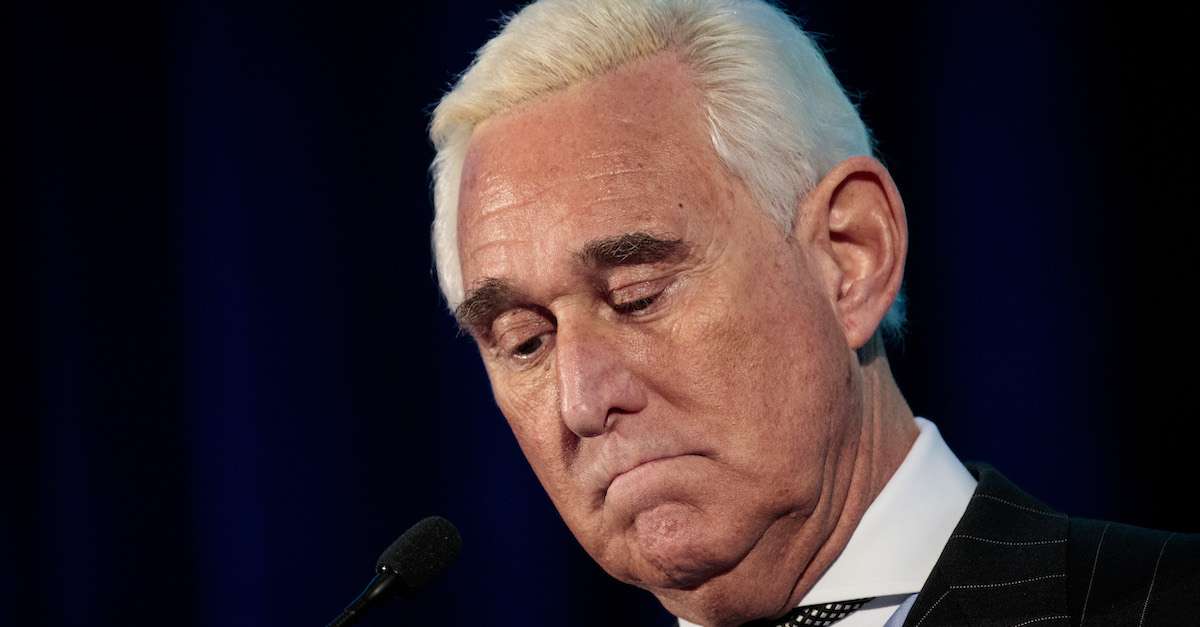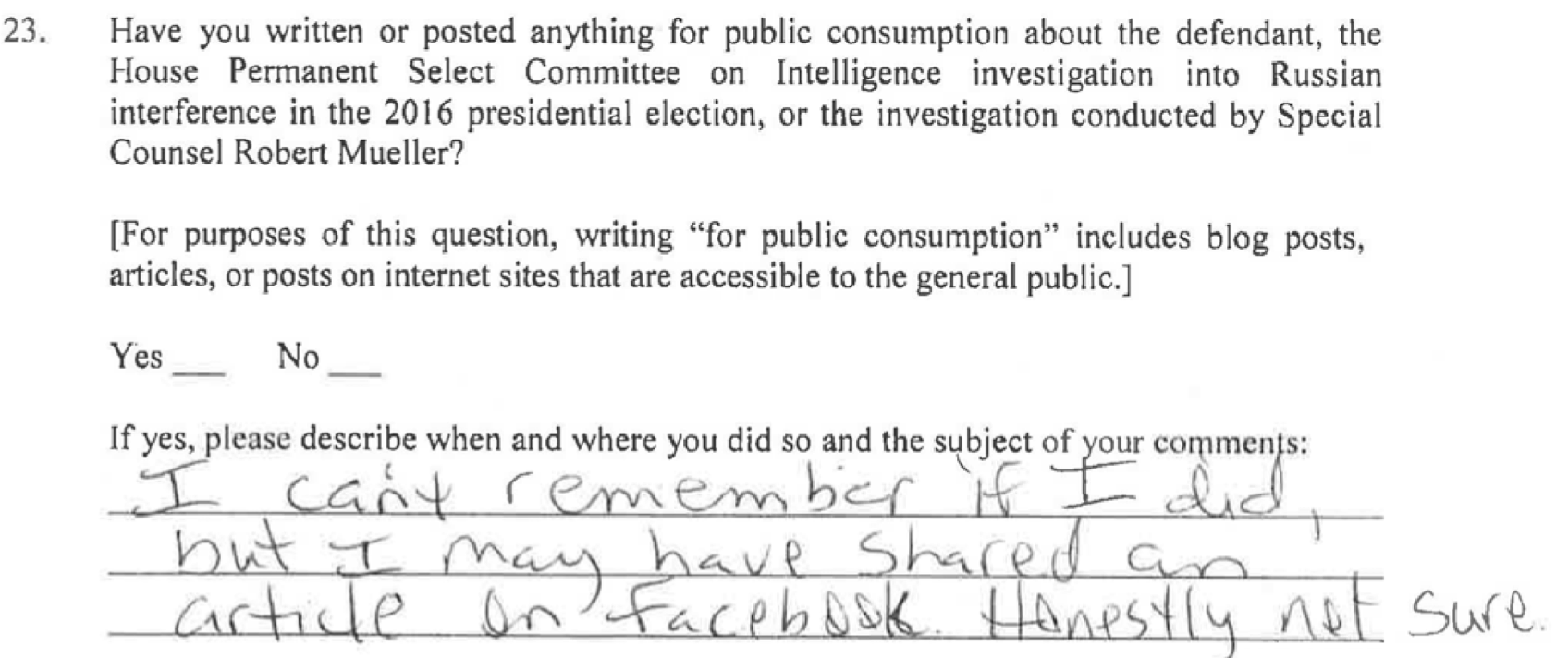
Convicted felon Roger Stone will not be getting a new trial, the federal judge in his case said Thursday in a straightforward, one-page order.
U.S. District Judge Amy Berman Jackson said that “In accordance with the Judgment entered on February 20, 2020 [Dkt. # 328], the conviction is final, and any appeal must be filed within fourteen days of the date of this order.”
The judge said that Stone must “surrender for service of his sentence at the institution designated by the Bureau of Prisons at such time as he is notified by the U.S. Probation or Pretrial Services Office, but no earlier than fourteen days after the date of this order.” Stone will be allowed to voluntarily surrender to begin serving his 40-month sentence.
Finally, Judge Jackson terminated the gag order muzzling Stone and has lawyers, which had been in place for more than a year.
“Also, as of the date of this order, the defendant and his attorneys are hereby released from the media communication order of February 15, 2019 [Dkt. # 36], the minute order of February 21, 2019, and the order of July 17, 2019, [Dkt. # 149], although all other Court orders, including those related to the confidentiality of materials, and all other conditions of the defendant’s release, remain in place,” the judge said.
Back in February, Jackson sentenced the longtime Trump friend and adviser to 40 months behind bars. Stone was found guilty of seven federal criminal counts for obstruction of justice, witness tampering and lying to federal investigators during Robert Mueller’s Russia investigation. Prosecutors even said Stone lied to protect President Donald Trump.
The trial took a week and a half. What happened after the trial proved to be a lot more controversial: the Department of Justice’s sentencing memo intervention, a mass exodus by prosecutors in protest, commentary from jurors, the president jumping into the fray, and a motion to disqualify the judge, to name a few.
While the new trial denial order was only one page, the accompanying memorandum opinion was not so brief. The 81-page opinion focused on Team Stone’s contention that jury foreperson Tomeka Hart was a Democratic partisan who lied her way onto the Stone jury and tainted the business of justice.
Judge Jackson said the burden of proof was on the defense to show that Hart told such a lie during jury selection. The judge said the defense fell way short because it’s “tower of indignation” was built on sand:
The defendant has not shown that the juror lied; nor has he shown that the supposedly disqualifying evidence could not have been found through the exercise of due diligence at the time the jury was selected. Moreover, while the social media communications may suggest that the juror has strong opinions about certain people or issues, they do not reveal that she had an opinion about Roger Stone, which is the opinion that matters.
The assumption underlying the motion – that one can infer from the juror’s opinions about the President that she could not fairly consider the evidence against the defendant – is not supported by any facts or data and it is contrary to controlling legal precedent. The motion is a tower of indignation, but at the end of the day, there is little of substance holding it up. Therefore, the request for a new trial will be denied based on the facts and the case law set out in detail in the body of this opinion […]
The judge said that during a hearing on the motion for a new trial, Stone’s lawyer “revealed that there was very little that even he would contend was false about the foreperson’s answers.”
“When pressed to identify a specific lie, Stone’s attorney pointed only to those answers in which the juror expressed her subjective belief that she could be fair to the defendant, and to one other question: the one concerning public commentary on certain topics,” the judge noted.
That question is pictured below.
It asked whether Hart had written or posted anything online about Stone, about the House Intel Committee’s probe of Russian interference, or about the Mueller probe.
Hart said “I can’t remember” while also saying she may have shared some stuff on Facebook but “honestly wasn’t sure.”

“The defendant has not shown that this answer was false. Notably, the juror did not check either ‘yes’ or ‘no,’ and she acknowledged the possibility that she may have shared an article in a Facebook post,” Jackson continued. “So what the defense has to prove is that she lied when she said she was ‘not sure.”
The defense didn’t do that, Jackson said.
“After consideration of the content of the questionnaire in its entirety, the foreperson’s statements and demeanor during voir dire, the posts in defendant’s composite exhibit, and the testimony adduced at the February 25 hearing, the Court finds that the foreperson did not answer questions falsely on the questionnaire or during voir dire, she did not engage in misconduct during the trial, and the defendant did not use diligence to discover the information present in his motion,” the judge concluded. “Therefore, the Court concludes in its discretion that the defense has not presented grounds for a new trial under Rule 33, nor has it supplied any reason to believe that there has been “a serious miscarriage of justice.”
The opinion also contains copies of Hart’s questionnaire and certain social media posts, posts that are political in nature.
Roger Stone denied a new trial by Law&Crime on Scribd
Memorandum Opinion Roger St… by Law&Crime on Scribd
[Image via Drew Angerer/Getty Images]